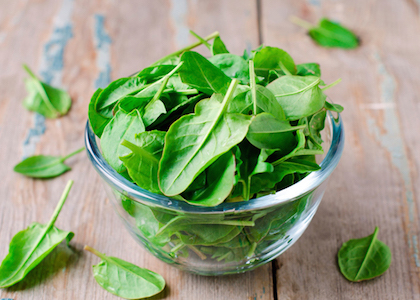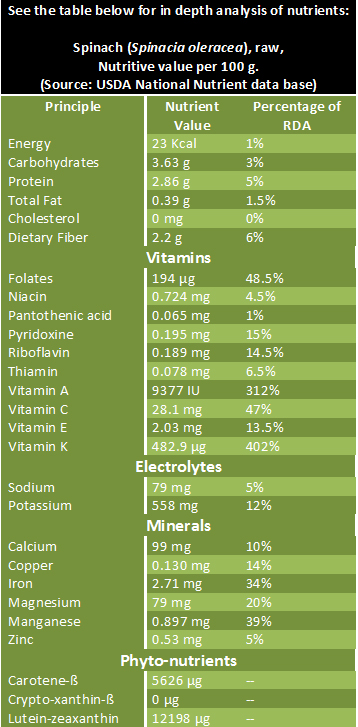
8 Reasons to Love Spinach
By Claire Georgiou, Reboot Naturopath, B.HSc ND
When Popeye ate his spinach he became big and strong and could take on any challenge, but what Popeye didn’t know was he was also reducing his risk of cancer, inflammatory diseases, eye degenerative diseases, cardiovascular disease and other health conditions.
Spinach has many amazing properties and is considered one of the most nutritious foods available! Spinach is a part of the beet family of vegetables which also includes beets (beetroot) and chard (silverbeet). Spinach has an extremely high nutritional value and is rich in antioxidants particularly beta-carotene, lutein and zeaxanthin, vitamin B2, vitamin C, vitamin E, vitamin K, and also contains magnesium, manganese, folate, iron, calcium and potassium.
Did you know that when spinach looks bright, vital and more appealing to the eye it actually contains more vitamin C which helps protect the other phyto-nutrients that are present in the leaves.
Some interesting studies showing the benefits of spinach:
- Spinach may reduce the risk of skin cancer, according to researchers from the Queensland Institute of Medical Research. Researchers found green leafy vegetables such as spinach and chard (silverbeet) are linked with a reduction in the risk of skin cancer, particularly among those with a previous history of the disease.
- A study found a bowl of spinach everyday increases muscle efficiency after just 3 days. The nitrates in the spinach leaf make the mitochondria (energy factories) more efficient.
- Spinach may block the formation of many forms of Cancer (due to the anti-oxidant nutrients and glycoglycerolipids content of Spinach)
- Regular spinach consumption cuts colon tumor formation by half
- Harvard Medical School evaluated the association between dietary flavonoid intake and ovarian cancer risk. Of all the flavonoids they tested, apigenin found in spinach as well as parsley, showed the highest correlation with a reduced risk. (International Journal of Cancer, April)
More facts on spinach!
- One cup of spinach contains over 337% of the RDA of vitamin A which protects and strengthens the mucus membranes “entry points” into the human body, such as respiratory, urinary and intestinal tracts, but is also a key component of lymphocytes (white blood cells) that fight infection.
- The vitamin K content in spinach helps reduce the risk of osteoporosis by preventing excess activation of osteoclasts (the cells that break down bones).
- Both antioxidants lutein and zeaxanthin are especially plentiful in spinach and protect the eye from cataracts and age-related macular degeneration. Spinach also boosts general eye health and has strong anti-aging properties.
Here are some great spinach based juices to try:
Are there negative sides to spinach?
Yes. Spinach is high in oxalic acid, which can bind with iron and calcium and cause your body to absorb less of these nutrients, consuming vitamin C rich foods such as citrus, peppers (capsicum) and strawberries will reduce this and aid the absorption of these nutrients, adding alittle lemon to a spinach based juice or using lemon as a dressing condiment will provide these wonderful benefits. Spinach can be associated with an increased risk of kidney stones in people who are predisposed to the condition.
